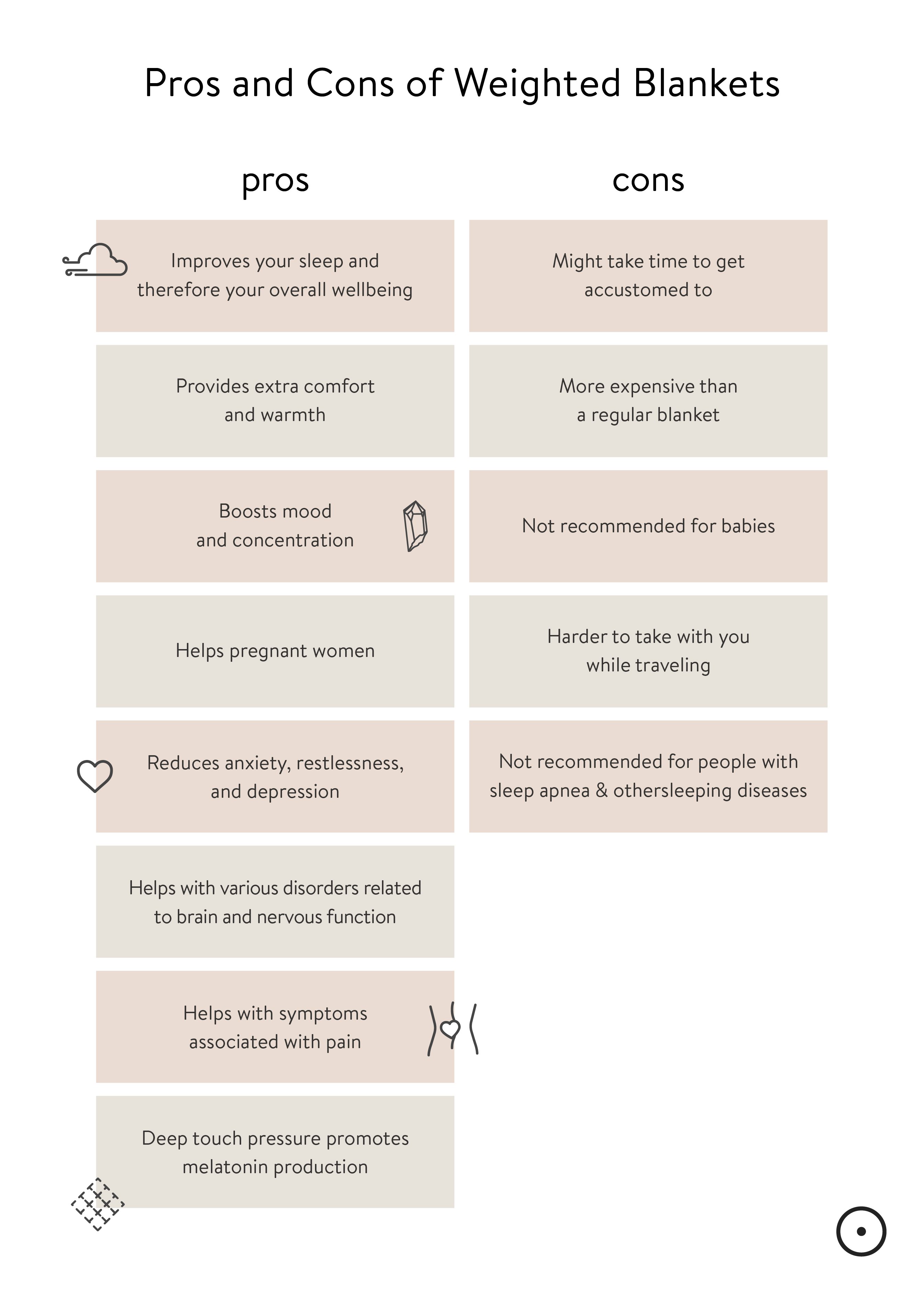Life has high expectations of us. We wake up early, get lost in transit, and work all day. Finally, when we return home, exhausted, there is only one thing we crave. To spring into bed and let a good night’s sleep take care of the rest.
But, despite the dim lights, soft bedding, and a strong desire to sleep, nature occasionally fails us. So, what are we overlooking? Weighted blankets.

How Do Weighted Blankets Work?
Weighted blankets exert pressure on the body, simulating a hug. So, if you're tense or anxious, the blanket triggers your parasympathetic nervous system, which slows your heart rate plus reduces blood pressure. Thus, a weighted blanket provides a sense of calmness.
What Are The Pros And Cons Of A Weighted Blanket?
Let’s learn about the advantages and disadvantages of using a weighted blanket, as well as why you should invest in one for restful sleep.
 Pros of Weighted Blankets:
Pros of Weighted Blankets:
1. Improves Your Sleep And Therefore Your Overall Wellbeing
One of the benefits of a weighted blanket is that it improves sleep by providing a sense of extra warmth and comfort. This brings good sleep, and it helps your body to get the rest it needs. That's why its efficient at treating people with insomnia - a sleep disorder characterized by trouble falling/staying asleep.
You can wake up and go about your day with a new glow and spurts of energy. Weighted blankets also help boost your mood and concentration, make you feel calm and relaxed. Talk about a boost to your overall well-being!
2. Provides Extra Comfort and Warmth
Contrary to popular opinion, weighted blankets are not any hotter than ordinary blankets. They do not generate any extra heat. However, because of their weight, these blankets are extremely comfortable for a quality sleep. Sleeping under a weighted blanket can be peaceful and relaxing.
3. Boosts Mood and Concentration
Among all the weighted blanket pros, this one is pretty vital. A weighted blanket helps you get uninterrupted and peaceful sleep. Because you sleep well, your body gets the rest it deserves. This in turn helps in boosting your mood and improving your concentration. So, both sleep and mental care are taken care of.
4. Helps Pregnant Women
Weighted blankets help to reduce the discomforts of pregnancy. If you are pregnant, no one can better understand the discomfort caused by your belly weighing you down. You tend to worry a lot during this period too. Will the pregnancy go smoothly? Is the baby healthy? Many questions might plague your mind.
All of these thoughts might occupy your mind at night and keep you awake, but that's where this sleep aid come in handy. It has a high success rate in reducing anxiety and stress. The blanket's added weight aids in the reduction of inflammation and swelling women experience during pregnancy.
5. Reduces Anxiety, Restlessness, And Depression
In the United States, anxiety affects about 40 million individuals. It does not just have an impact on mental health, but also affects the body physically such as digestion and sleep quality.
Weighted blankets have proven to minimize anxiety - one of the top mental health disorders. Since anxiety and stress are typically interlinked, there is sufficient credibility that it helps to alleviate stress as well. The reason why the weighted blankets are so helpful for sleep health is that they apply soothing pressure on your whole body. This aids in reducing anxiety symptoms such as rapid heartbeat and rapid breathing.
It relieves depression by releasing the hormones melatonin, dopamine, and serotonin. These hormones, generated in the brain, are responsible for elevating mood, boosting happiness, and reducing tension and restlessness.
6. Helps With Various Disorders Related To Brain, Nervous Function And Genetics.
A weighted blanket can benefit people with a variety of disorders with its gentle pressure, including bipolar disorder, autism spectrum disorder, attention deficit hyperactivity disorder (ADHD), down syndrome, and, as we've seen, anxiety disorders.
A study revealed that after resting beneath a 30-pound blanket for 5 minutes, 63 percent of 32 adult participants reported feeling less anxious. Weighted blankets have also been proven to improve the overall quality of sleep for children with autism spectrum disorders. According to the research, weighted blankets helped to significantly improve sleep by reducing wake-up intervals, the time it takes to fall asleep, and extended the maximum hours of sleep.
7. Helps With Symptoms Associated With Pain
When it comes to weighted blankets, these can help with most types of body pains. Chronic pains, headaches, and even the pain symptoms that are caused by restless leg syndrome - weighted blankets can reduce all. Even research has backed it up, claiming that the pressure provided by weighted blankets decreased pain responses in people suffering from chronic pain.
8. Deep Touch Pressure/Promotes Melatonin Production
Weighted blankets help in releasing serotonin, which helps with the severe mood swings that pregnant women experience. Serotonin and melatonin are released as a result of the weighted blanket's deep pressure stimulation. Serotonin is a well-known mood enhancer, creating a happier, more relaxed feel, while Melatonin aids in better sleep.
Cons of Weighted Blankets:
1. Might Take Time To Get Accustomed To
These 10-15 pounders may be rather heavy on your body, so it may take some time to get used to them. This is why doctors recommend getting one that is 10% of your body weight. Having said that, the heavyweight of this blanket necessitates the use of layering. As a result, they may be a menace in the summer. If you're not used to sleeping with blankets but recognize their benefits, be prepared for a little struggle with your blanket. If you're used to heavy blankets, go ahead and welcome a weighted blanket onto your bed.
2. More Expensive Than A Regular Blanket
These blankets are medically recommended, therefore they aren't your typical blankets. There are several manufacturing and product-related variables that contribute to their high cost. When it comes to producing these blankets, only the best raw materials are utilized, which are also quite expensive. Producing these blankets takes a long time and requires the best labor, manpower, packaging, and fillers.
Some blankets even add amethyst, clear quartz, and rose quartz as weights for their calming and soothing effects. The blanket's outside is quilted and double stitched to give it a smooth feel and ensure that it stays put. The majority of blankets, regardless of size, cost between $100 and $300.
3. Not Recommended For Babies
Can weighted blankets be harmful? Yes, especially in the case of infants and newborns. These blankets pose a suffocation risk to newborns. Never ever use a weighted blanket on a baby or toddler. It is recommended that you get one that is 10% of your body weight; nevertheless, in the case of children, never assume that any blanket will suffice. If a baby is pinned down by a weighted blanket, they cannot assist themselves, or move freely. The longer they are trapped beneath it, the less air they can breathe. This might ultimately lead to choking. Despite what some people believe, sleep specialists advise against using them on newborns and even older children with developmental problems.
Always consult a doctor before using them on children.
4. Harder To Take With You While Traveling
Weighted blankets can weigh up to 20 pounds depending on your weight, not to mention the size and surface area they may occupy. If you're traveling with limited luggage space, there's no way you'll be able to squeeze this in, especially given airport weight restrictions. You would have to consider a lighter alternative to travel with.
5. Not Recommended For People With Sleep Apnea & Other Sleep/Respiratory Diseases
Despite its benefits, some people may find weighted blankets to be detrimental to their health. So, patients with sleep apnea are an exception. Sleep apnea is a respiratory condition that causes people to stop breathing for brief periods of time while sleeping.
Weighted blankets can be dangerous since they can exacerbate respiratory problems owing to the blanket's pressure and tightness on the body. Especially if it is near the lungs. This is also true for people with asthma and obstructive pulmonary disease (COPD). People with claustrophobia may be triggered by the engulfing sensation induced by the blanket's tightness and weight.
FAQ: Pros and Cons of Weighted Blankets
Is It Ok To Sleep With A Weighted Blanket Every Night?
Yes, it is safe to sleep with a weighted blanket all night provided you do not suffer from respiratory diseases.
Are Weighted Blankets Safe?
Despite its various advantages, thanks to the deep pressure therapy, it is difficult to label weighted blankets as completely safe. A weighted blanket (aka gravity blanket) should be avoided by those with circulatory diseases, respiratory ailments, claustrophobia, children under the age of two, and sleep apnea patients. Before attempting to use a weighted blanket, consult a pediatrician or physician if you suffer from any of these conditions.
Are Weighted Blankets Good For You?
Yes, of course! If you're suffering from anxiety, a weighted blanket can be a great way to relax and calm your mind. It's also been shown to help people with insomnia, Restless Leg Syndrome (RLS), and other conditions that cause discomfort or pain.
It's a good practice to consult a doctor before using a weighted blanket, just to make sure it's the right thing for you.
Are Weighted Blankets Bad For Circulation?
Yes, diabetic patients and patients with circulatory diseases should also avoid using weighted blankets since they might impair circulation.
What Material Are Used in the Construction of a Weighted Blanket?
Most weighted blankets are made of cotton, polyster, fleece, etc. They can be filled with various materials such as plastic pellets, tiny glass beads, etc. Some weighted blankets also come with a removable cover for easy cleaning.
The Final Verdict on the Pros and Cons of Weighted Blankets
Weight blankets have therapeutic benefits and provide a pleasant, inviting atmosphere for you to sleep in. They are quite useful in many ways, but they do come with a few hazards that only affect a small percentage of people.
Weighted blankets come in a variety of sizes, shapes, colors, and patterns. So have a seat and choose one that complements the color scheme of your space. Who says you can't have comfort and style in one package?
.jpg?v=1644629808626)
Sources:
https://pubmed.ncbi.nlm.nih.gov/32204779/
https://aasm.org/study-shows-weighted-blankets-can-decrease-insomnia-severity/
https://www.diva-portal.org/smash/record.jsf?pid=diva2%3A1081315&dswid=-8300
https://www.sleephealthsolutionsohio.com/blog/weighted-blankets-sleep-better/
https://www.diva-portal.org/smash/record.jsf?pid=diva2%3A1081315&dswid=-8300
https://www.magonlinelibrary.com/doi/abs/10.12968/ijtr.2016.23.4.173
https://health.clevelandclinic.org/can-weighted-blankets-banish-nighttime-anxiety/
https://www.painscale.com/article/weighted-blankets-help-or-hype


